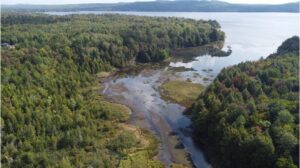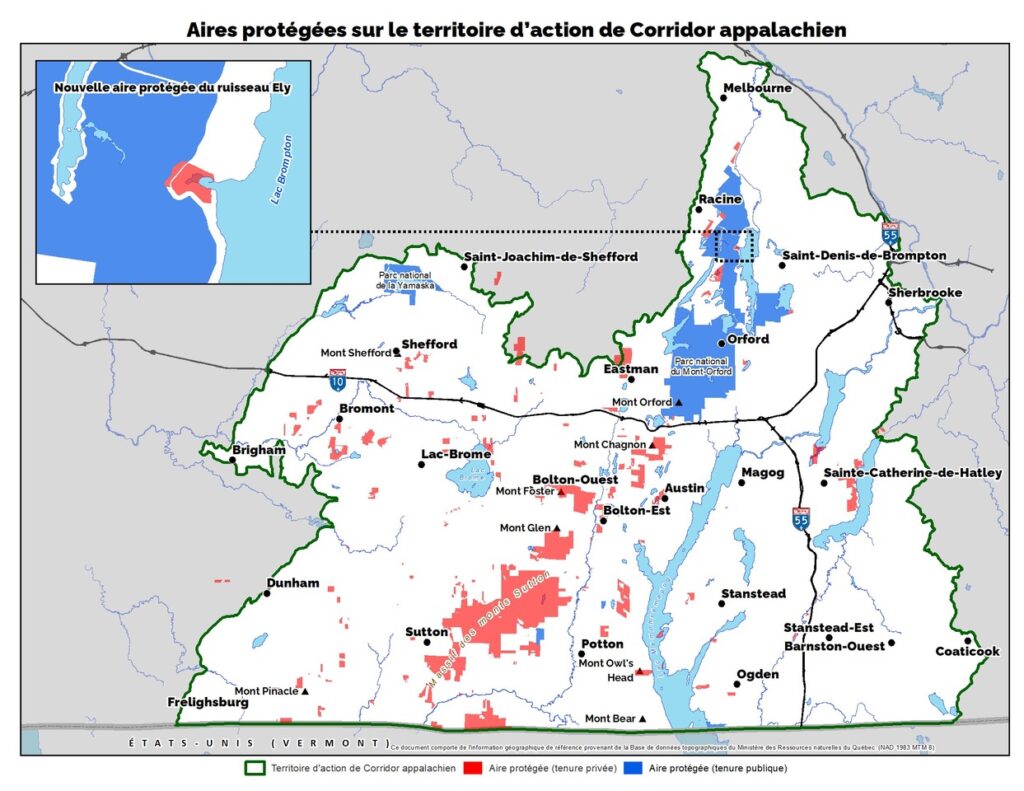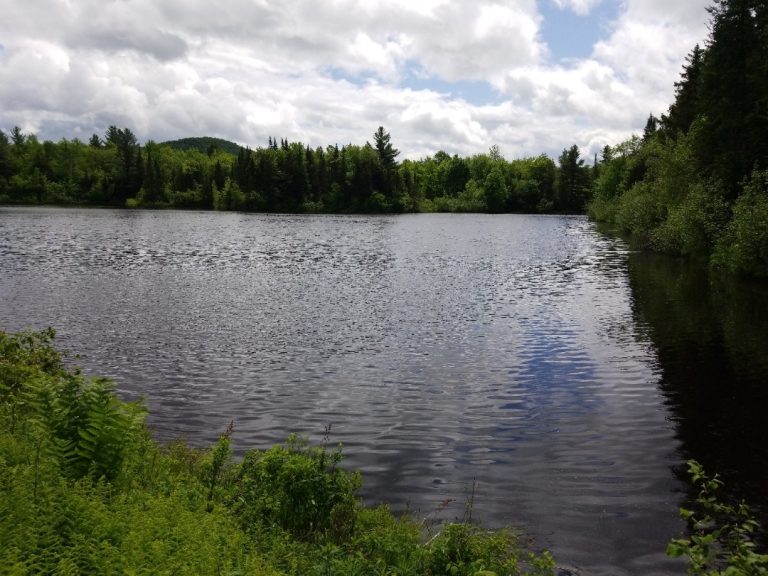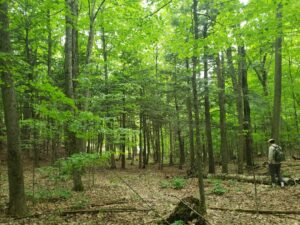AN UNPRECEDENTED MOBILIZATION ALLOWS THE PROTECTION OF 20 HECTARES ALONG LAKE BROMPTON
Racine, QC (June 22, 2022) – Appalachian Corridor is proud to announce the completion of its first conservation project in perpetuity in the Lake Brompton sector. The 20.3-hectare land is located on the northwest shore of Lake Brompton in the municipality of Racine, in the Eastern Townships. This acquisition project was made possible thanks to the participation of the provincial and federal governments and enhanced by an expeditious citizen mobilization that gave Appalachian Corridor the necessary impetus to complete this transaction.
The newly created “Ely Stream Protected Area” borders the Parc national du Mont-Orford expansion project to the northwest and is located within a core habitat area of nearly 3,000 ha within Appalachian Corridor’s territory of action. The Ely stream originates in the heart of the Parc national du Mont Orford expansion project and flows through the targeted property to empty into Lac Brompton. The conservation of the property in perpetuity thus improves ecological connectivity between the national park expansion project and Brompton Lake.
Protected areas in the Appalachian Corridor territory and location of the new Ely Stream Protected Area
“Our entire team is delighted with the realization of this important project, especially in the challenging context of a rising real estate market, where conservation organizations like ours are in a race against time to protect nature for ecological reasons and in an effort to adapt to climate change,” says Mélanie Lelièvre, Executive Director of Appalachian Corridor. “Without the support of citizens and our financial partners, we would not have been able to protect this ecological wealth,” she adds.
THE MARIANNHILL MISSIONARY CONGREGATION RETURNS TO NATURE A JEWEL THEY HAVE PRESERVED FOR OVER 70 YEARS
 Mélanie Lelièvre, Executive Director of Appalachian Corridor and Mr. Alain Rodrigue, Mariannhill Missionary. Photo: Appalachian Corridor
Mélanie Lelièvre, Executive Director of Appalachian Corridor and Mr. Alain Rodrigue, Mariannhill Missionary. Photo: Appalachian Corridor
The Mariannhill Missionary congregation acquired the property in 1951 with the intention of using it as a nature retreat. However, the group expressed its intention to divest itself of the property last year. Given its white zoning and status as one of the last remaining lakefront lots on the lake, the property was highly prized by real estate developers.
Appalachian Corridor had to operate with great speed and creativity to complete the financing required to achieve the project, which represents a conservation investment of nearly $1.1 million. An exemplary citizen mobilization, to the tune of $250,000, contributed to the acceleration of the acquisition of the property.
“We are grateful that the Mariannhill congregation chose the path of conservation and that several donors have joined us in seizing the opportunity to protect this precious ecological jewel forever,” says Ms. Lelièvre, who has been at the head of the conservation organization for 15 years.
GAINS FOR ECOLOGICAL CONNECTIVITY, SPECIES AT RISK, AND WATER QUALITY
 The land features mature forest communities with red maple, sugar maple, and wetlands, marshes and riparian habitats on Lake Brompton and a portion of open water.
The land features mature forest communities with red maple, sugar maple, and wetlands, marshes and riparian habitats on Lake Brompton and a portion of open water.
“In terms of species at risk on the property, there are habitats for the Northern Dusky Salamander, a species likely to be designated as threatened or vulnerable, and the Spring Salamander, designated as vulnerable in Quebec. The site also contains suitable habitats for various species of turtles, which have a special status in Quebec and Canada,” explains Clément Robidoux, director of conservation at Appalachian Corridor.
“In addition to increasing the ecological connectivity of this sector and improving conditions for certain species in a precarious situation, the protection of the riparian wetlands of Lake Brompton will also ensure the maintenance of the quality of the lake’s water,” concludes the biologist.
NEW PARTNERS ENABLE $1.1 MILLION INVESTMENT IN NATURE AND COMMUNITIES
In the context of this project, Appalachian Corridor would like to extend special thanks to the Ministère de l’Environnement et de la Lutte contre les changements climatiques, which granted financial assistance of more than $53 million over four years to the Nature Conservancy of Canada for its Natural Environment Partnership Project (PPMN), which covered nearly 50% of the project costs.
“Our partnerships with conservation organizations such as Appalachian Corridor allow the Quebec government to accelerate the pace of protection of natural environments and species in precarious situations. This is an invaluable contribution, particularly in southern Quebec, where development pressures are greatest and where biodiversity is richest. I would like to highlight the mobilization of citizens in this project. It is proof that we can all make a difference,” said Benoit Charette, Minister of the Environment and Climate Change, Minister responsible for the Fight Against Racism and Minister responsible for the Laval region.
Environment and Climate Change Canada also contributed to the project through the Community Designated Priority Sites for Species at Risk program of the Canada Nature Fund.
The scope and short time frame of the project required the involvement of new conservation partners for Appalachian Corridor, namely Ducks Unlimited Canada and the Association pour la protection du lac Brompton (APLB).
“Ducks Unlimited is extremely proud to be a partner in this acquisition,” says Sébastien Rioux, Director of Provincial Operations for Québec for Ducks Unlimited Canada. “The protection of the property’s wetlands and natural environments will provide multiple ecological services to the population, such as carbon capture, water supply and flood protection. In a context where 70% of the wetlands in certain inhabited regions of southern Quebec have disappeared to date, the protection of these habitats, which are among the richest on the planet, is of the utmost importance for current and future generations,” he adds.
Denis Mercier, President for the Association pour la protection du lac Brompton. Photo: Appalachian Corridor
For Denis Mercier, president of the APLB says that “the realization of this conservation project in an area of great biodiversity threatened by development projects is a win-win situation for our community and is directly in line with the mission of our association. The mobilization of citizens to raise the local contribution was exceptional and shows how much our community cares about the health of the lake. Our organization is proud to have supported the Appalachian Corridor initiative and we plan to build on this momentum with new projects to continue to ensure the sustainability of Lake Brompton’s exceptional natural heritage for present and future generations,” he expresses.
The municipality of Racine, where the property is located, also contributed financially to the project.
“The municipal council and I are pleased to have been able to participate in the acquisition for the protection of this property,” says Mayor Mario Côté. “The preservation of this natural heritage will be an invaluable legacy for future generations.”
ABOUT
Projet de partenariat pour les milieux naturels (PPMN)
The PPMN is a four-year grant of more than $53 million from the Ministry of the Environment and Climate Change to the Nature Conservancy of Canada (NCC). It provides for the establishment of financial partnerships with the province’s conservation organizations to support initiatives to ensure the protection of natural environments of interest. The PPMN thus aims to develop and consolidate the Quebec network of protected areas located on private land. https://www.environnement.gouv.qc.ca/infuseur/communique.asp?no=4407
Canada’s Nature Fund Community Designated Priority Sites for Species at Risk
The Nature Trust of Canada’s Community Designated Priority Sites for Species at Risk initiative is a four-year, $15.6 million funding initiative of Environment and Climate Change Canada. https://www.canada.ca/en/environment-climate-change.html
Ducks Unlimited Canada
Ducks Unlimited Canada is a leader in wetland conservation. As a registered charity, DUC works with government, industry, non-profit organizations and landowners to conserve wetlands that are vital to waterfowl, wildlife and the environment. https://www.ducks.ca/
Appalachian Corridor
Appalachian Corridor is a non-profit conservation organization celebrating its 20th anniversary in 2022. Its mission is to protect the natural environments of the Appalachian region of southern Quebec. Through the implementation of its conservation strategy, Appalachian Corridor provides local communities with the means to maintain and restore a living environment that respects the ecology of the region, from a sustainable development perspective. A total of 17 local organizations are affiliate members of Appalachian Corridor and together they contribute to accelerating and increasing the conservation projects carried out on the territory. Since the beginning of its activities, the extent of the areas protected by Appalachian Corridor and its partners totals more than 15,600 hectares of land protected forever – equivalent to the surface area of the city of Granby. www.corridorappalachien.ca
CONTACT
Frédérique Vuillermoz
Communications Coordinator
frederique.vuillermoz@corridorappalachien.ca
Cell: 450 543-4999





